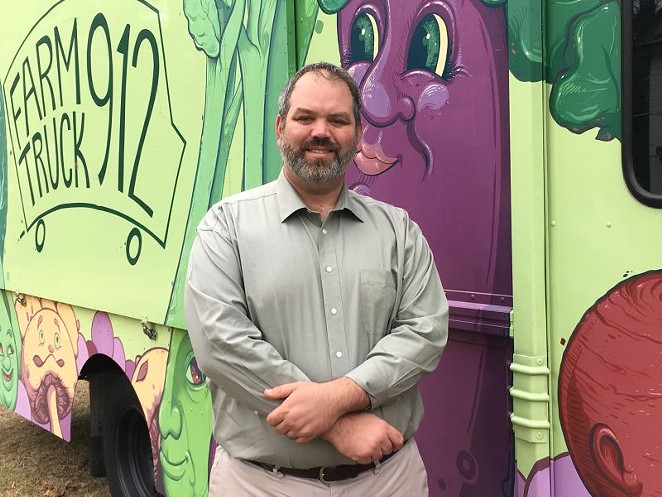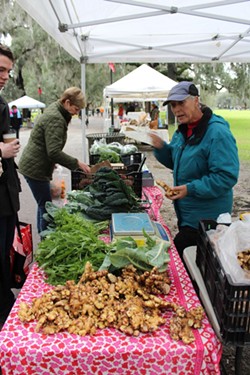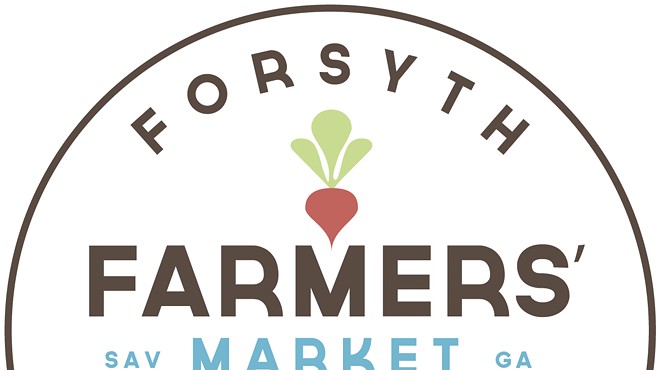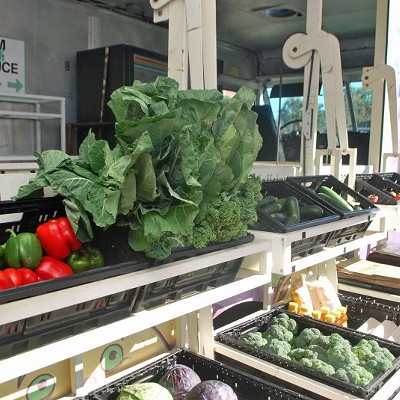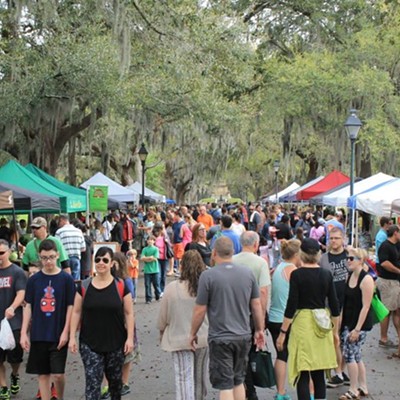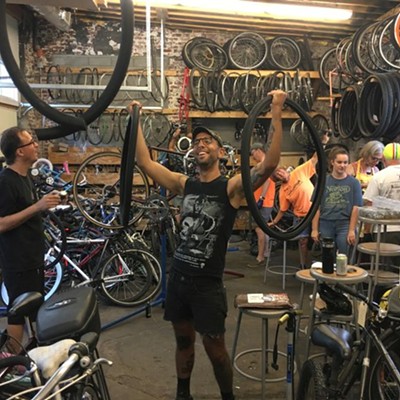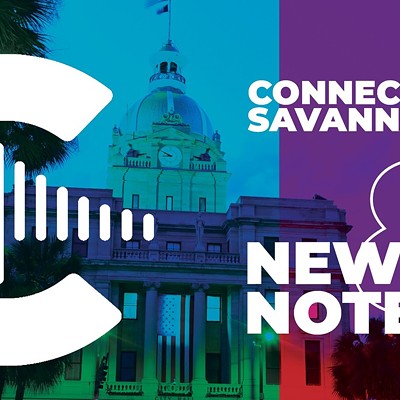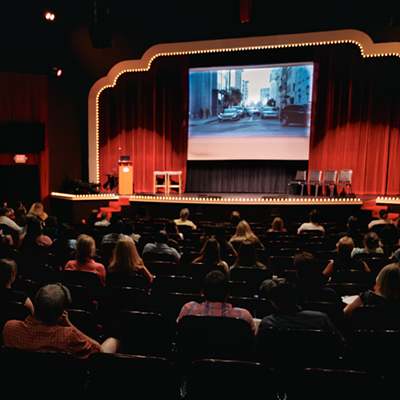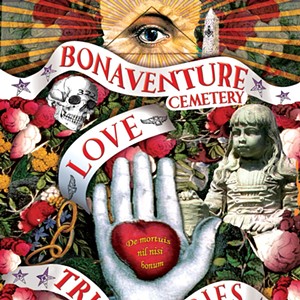COME MOST every Saturday, rain or shine or even snow, vendors set out rows of just-picked produce along Forsyth Park’s oak-shaded central corridor.
The Forsyth Farmers Market has been Savannah’s weekly destination for leafy greens, foodie communion and sustainability education for almost nine years, holding fast to its commitment that vendors must produce at least 75 percent of their wares. The market also focuses on the accessibility of fresh, healthy food for all by cultivating an inclusive, diverse atmosphere and offering double value for those using the federal supplemental nutrition assistance program (SNAP).
Those efforts were spearheaded and cultivated by FFM co-founder and former Executive Director Teri Schell, who moved back to her native Alabama last summer.
FFM’s tiny dedicated staff—along with its passionate volunteers, hard-working farmers and loyal customers—continued to show up every Saturday through the fall (save the week Hurricane Irma spun through), in spite of being a flock without a shepherd.
That changed in November, when the non-profit hired Jeb Bush (no, no relation; yeah, he gets that a lot.) With career stints at the Girl Scouts of America and the United Way, Bush is well-versed in non-profit management and marketing.
But it also helped that he had another vital qualification for the job: He’s a farmer himself. The owner of High Hope Plantation grows vegetables and raises chickens in Estill, SC, where he works his ten acres of land with his husband, full-time nurse Dave Nathe.
Connect spoke with the new Executive Director at the market’s offices in Thunderbolt about the smart economics of eating seasonally, farming differently than his parents, and how Farm Truck 912 is going to make fresh veggies even more accessible in 2018.
How did your farm fare with our recent snowstorm?
Jeb Bush: Well, it took a bit of a beating. All the lettuce is gone, but the other stuff seems to be coming back to life now—we’ve got tons of greens, kales and cabbage. I don’t think it will affect the market too much; a lot of our market farmers have row covers to protect their crops, so hopefully they’re going to be OK. We had a few out there selling with the snow!
When did you begin farming?
I actually grew up on a farm, about three miles from where I live now—my little field is in my parents’ backyard. I moved to Savannah in 2006 to work for the Girl Scouts at the Juliette Gordon Low Birthplace, then I worked at the United Way for two years—I’m a total non-profit boy.
In 2015, I got kind of burned out and needed to step back so I thought, I’ll be a farmer, it’s in my blood! Daddy was Big Ag—cotton, corn, soybeans— but I wanted to do produce. I’ve always enjoyed my own little garden and I wanted to take that to the next level.
We also have a lot of chickens, about 150 now. I started out with five in the backyard when I lived off Skidaway Road.
How did you become involved with the market?
I became a vendor, and I just loved it. When the director position came up, I was like, nah. It was more important to me to be spending time on the farm with Mom and Daddy who are both getting up there in age. But the more I thought about it, I realized this is an opportunity to make a really big difference in a lot of people’s lives.
Has it been challenging to step into Teri Schell’s big boots?
I know, I’m coming in directly with the founding executive director as my predecessor, so it sounds daunting. It was actually Teri who brought my business to the Forsyth Farmers Market, and she and I still have a great relationship. I have no problem shooting her a text, throwing out new ideas to her to see what she thinks. I’m doing my own thing, but I embrace the work that she did to establish thhe tone of the market. The actions we do at this market really do help a lot of people.
Starting with the farmers?
It helps the farmers. Everything we do goes back to the fact that we are farmers market. Yes, we have other food vendors, but the city comes together every Saturday to support 20 to 24 farmers who are working hard all week and bringing that produce in. I felt with my marketing and non-profit background I could be an advocate for them.
But our mission goes beyond helping farmers. We want to make sure that everyone in Savannah has access to this fresh, healthy food these farmers are growing.
We’re also helping people with diabetes, heart disease, issues that this particular county faces a lot of—some of it is systemic, but some of it is due to the fact that fresh food is not available to many people. We have food desert issues across this community.
How do you rectify that?
Starting at the market, we’ve got the double SNAP benefits, which is so important for our low-income residents. We’re the second largest redeemer of the SNAP benefit program in the state of Georgia, so that means we’re getting the word out in our community that the market is for everybody.
I think there’s a misperception that the market is for rich people. People think everything is expensive at the farmers market, but we need to learn how to eat seasonally, because prices come down. And with SNAP benefits, a pound of tomatoes that was two dollars becomes a dollar, and all of the sudden we’re cheaper than the grocery store.
And this is important: On the second Saturday of every month, we will have SNAP enrollment and renewal. So if people aren’t receiving any benefits and they’re eligible, we have the ability to enroll individuals in the program.
We hear that the mobile market—this awesome Farm Truck 912 you’re standing in front of—is going to be more visible this year.
We’re currently reworking the schedule looking to get into some new places and also build on the success we’ve had in the regular neighborhoods. We have a new farm truck manager, and we’re hoping to get into nine locations this year—that means fresh produce in those places every week. That’s going to be a big jump.
We’ll also be continuing our partnership with Mercer Medical School, and medical students will volunteer to do health screenings. The first Saturday of the month we’ll have education programs for kids and for adults on third Saturdays.
So the Forsyth Famers Market will continue to be a vehicle for social change?
I think when we’re all healthier, we’re better. When the poorest people in our community are receiving the nutrition they need, that gives them the opportunity to work more, to advocate for themselves and neighbors more.
Is that directly social justice? Not necessarily. But is the work that we’re doing social justice? Yes, definitely.
What are your favorite seasonal foods?
Come spring, I love my strawberries. This time of year, it’s about the turnips! People think they’re the most humble food ever, but I’ll eat them every week.
Cube ‘em up, toss ‘em in olive oil and salt and pepper, then put them in the over at 400 degrees for 40 minutes. They come out perfect every time.

